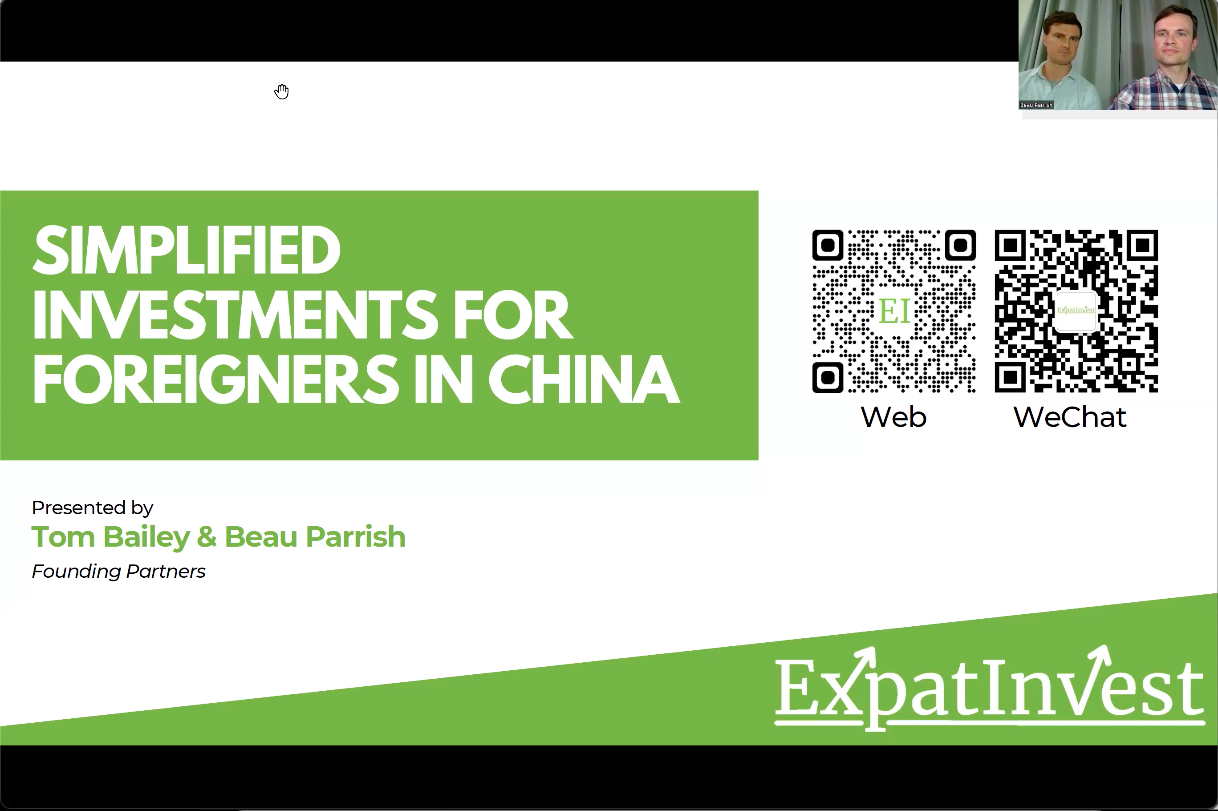
A collection of financial terms related to the Chinese markets. For each piece of vocab, we’ve added the [Simplified] Chinese, Pinyin, and a short definition.
Terms are listed alphabetically by default.
If you’re looking for more than vocab, this companion piece breaks down China market terms in more detail –> The Chinese Stock Markets: Terms Acronyms Guide
Scroll to view more info >>
| English Name | Chinese Name | Pinyin | Definition | Resource |
|---|---|---|---|---|
| A-shares | A股 | A gǔ | Mainland China stocks traded in RMB | |
| Arbitrage | 套利 | Tào lì | Profiting from price differences in different markets. | |
| Ask | 卖价 | Mài jià | The lowest price a seller is willing to accept for an asset. | |
| Asset allocation | 资产配置 | Zīchǎn pèizhì | The strategy of dividing investments among different asset categories. | |
| Asset classes | 资产类别 | Zīchǎn lèibié | Categories of investments with similar characteristics. | |
| B-shares | B股 | B gǔ | Mainland China stocks traded in foreign currencies | |
| Bear market | 熊市 | Xióng shì | A market characterized by falling prices and pessimism. | |
| Beijing Stock Exchange (BSE) | 北京证券交易所 | Běijīng zhèngquàn jiāoyì suǒ | A stock exchange based in Beijing, China, focusing on innovative small and medium-sized enterprises. | Our Intro to the BSE |
| Beta | 贝塔系数 | Bèitǎ xìshù | A measure of a stock’s volatility in relation to the overall market. | |
| Bid | 买价 | Mǎi jià | The highest price a buyer is willing to pay for an asset. | |
| Bid-ask spread | 买卖价差 | Mǎimài jià chā | The difference between the highest bid and lowest ask prices. | |
| Blockchain | 区块链 | Qū kuài liàn | A decentralized, distributed ledger technology. | |
| Blue-chip stocks | 蓝筹股 | Lán chóu gǔ | Stocks of well-established, financially sound companies. | |
| Bond | 债券 | Zhài quàn | A debt investment representing a loan made by an investor to a borrower. | |
| Bull market | 牛市 | Niú shì | A market characterized by rising prices and optimism. | |
| Buyback | 股票回购 | Gǔpiào huígòu | When a company repurchases its own shares from the marketplace. | |
| Capital gains | 资本利得 | Zīběn lìdé | The profit from the sale of an asset at a higher price than purchased. | |
| ChiNext | 创业板 | Chuàngyè bǎn | Shenzhen’s board for high-growth, high-tech startups | |
| CNY | 在岸人民币 | Zài’àn rénmínbì | Onshore Chinese yuan | |
| Common stock | 普通股 | Pǔtōng gǔ | Shares representing ownership in a corporation. | |
| CSRC (China Securities Regulatory Commission) | 中国证券监督管理委员会 | Zhōngguó zhèngquàn jiāndū guǎnlǐ wěiyuánhuì | The main regulator of China’s securities industry | |
| Current ratio | 流动比率 | Liúdòng bǐlǜ | A liquidity ratio measuring a company’s ability to pay short-term obligations. | |
| Day trading | 日内交易 | Rì nèi jiāoyì | Buying and selling financial instruments within the same trading day. | |
| Debt-to-equity ratio | 负债权益比率 | Fùzhài quányì bǐlǜ | A measure of a company’s financial leverage. | |
| Dim sum bonds | 点心债券 | Diǎnxīn zhàiquàn | RMB-denominated bonds issued outside mainland China | |
| Diversification | 多元化 | Duōyuánhuà | Spreading investments across various financial instruments to reduce risk. | |
| Dividend | 股息 | Gǔxī | A distribution of a company’s earnings to shareholders. | |
| Dividend yield | 股息收益率 | Gǔxī shōuyìlǜ | The annual dividend per share divided by the stock’s price. | |
| Dollar-cost averaging | 定投 | Dìng tóu | Investing a fixed amount regularly, regardless of market conditions. | How Dollar-Cost Averaging Works |
| Dow Jones Industrial Average (DJIA) | 道琼斯工业平均指数 | Dào qióng sī gōngyè píngjūn zhǐshù | A stock market index of 30 prominent companies listed on US stock exchanges. | |
| Earnings per share (EPS) | 每股收益 | Měi gǔ shōuyì | A company’s profit divided by its number of outstanding shares. | |
| Economic bubble | 经济泡沫 | Jīngjì pàomò | When asset prices rise far above their intrinsic value. | |
| Exchange | 交易所 | Jiāoyì suǒ | A marketplace where securities, commodities, derivatives and other financial instruments are traded. | |
| Exchange-traded funds (ETFs) | 交易所交易基金 | Jiāoyì suǒ jiāoyì jījīn | Investment funds traded on stock exchanges, much like stocks. | |
| Expense ratio | 费用率 | Fèiyòng lǜ | The annual fee that all funds charge their shareholders. | |
| Futures | 期货 | Qīhuò | Contracts obligating the buyer to purchase an asset at a predetermined future date and price. | |
| Going long | 做多 | Zuò duō | Buying a security with the expectation that it will increase in value. | |
| Going short | 做空 | Zuò kōng | Selling a borrowed security with the expectation that it will decrease in value. | |
| Growth and income funds | 成长与收益基金 | Chéngzhǎng yǔ shōuyì jījīn | Mutual funds that aim for both capital growth and current income. | |
| Growth stocks | 成长股 | Chéngzhǎng gǔ | Shares in companies expected to grow at an above-average rate. | |
| H-shares | H股 | H gǔ | Mainland China companies listed in Hong Kong | |
| Hang Seng Index (HSI) | 恒生指数 | Héng shēng zhǐshù | A free-float-adjusted market-capitalization-weighted stock market index in Hong Kong. | |
| Hong Kong Stock Exchange (HKEX) | 香港交易所 | Xiānggǎng jiāoyì suǒ | The stock exchange of Hong Kong, Asia’s third-largest stock exchange in terms of market capitalization. | |
| Index funds | 指数基金 | Zhǐshù jījīn | Mutual funds designed to track the performance of a market index. | |
| Inflation | 通货膨胀 | Tōnghuò péngzhàng | The rate at which the general level of prices for goods and services is rising. | |
| Initial public offering (IPO) | 首次公开募股 | Shǒucì gōngkāi mù gǔ | The first sale of stock by a private company to the public. | |
| IPO lockup period | 首次公开募股锁定期 | Shǒucì gōngkāi mù gǔ suǒdìng qī | Restrictions on selling newly public company shares | |
| Limit order | 限价订单 | Xiàn jià dìngdān | An order to buy or sell a stock at a specific price or better. | |
| Liquidity | 流动性 | Liúdòngxìng | The ease with which an asset can be converted into cash. | |
| Margin | 保证金 | Bǎozhèngjīn | Borrowed money used to purchase securities. | |
| Market index | 市场指数 | Shìchǎng zhǐshù | A method to track the performance of a group of assets in a standardized way. | |
| Market volatility | 市场波动性 | Shìchǎng bōdòngxìng | The degree of variation of a trading price series over time. | |
| Moving average | 移动平均线 | Yídòng píngjūn xiàn | A widely used indicator in technical analysis that helps smooth out price action. | |
| Mutual funds | 共同基金 | Gòngtóng jījīn | Investment vehicles made up of a pool of funds collected from many investors. | What are Mutual Funds? |
| NASDAQ | 纳斯达克 | Nà sī dá kè | An American stock exchange, the second-largest in the world by market capitalization. | |
| NEEQ (National Equities Exchange and Quotations) | 全国中小企业股份转让系统 | Quánguó zhōng xiǎo qǐyè gǔfèn zhuǎnràng xìtǒng | Also known as the “New Third Board” | |
| Non-fungible token (NFT) | 非同质化代币 | Fēi tóng zhì huà dàibì | A unique digital asset that represents ownership of a specific item or piece of content. | |
| OTC stocks | 场外交易股票 | Chǎngwài jiāoyì gǔpiào | Stocks that trade via a dealer network rather than on a centralized exchange. | |
| Outstanding shares | 流通股份 | Liútōng gǔfèn | The number of a company’s shares that are currently held by all its shareholders. | |
| P-chips | P股 | P gǔ | Private Chinese companies incorporated outside mainland China and listed in Hong Kong | |
| P/E ratio | 市盈率 | Shì yíng lǜ | The ratio of a company’s share price to its earnings per share. | |
| Panda bonds | 熊猫债券 | Xióngmāo zhàiquàn | RMB-denominated bonds from non-Chinese issuers sold in China | |
| PBOC (People’s Bank of China) | 中国人民银行 | Zhōngguó rénmín yínháng | China’s central bank | |
| Preferred stock | 优先股 | Yōuxiān gǔ | A class of ownership that has a higher claim on assets and earnings than common stock. | |
| Price quote | 报价 | Bàojià | The most recent price at which an investment has traded. | |
| Profit margin | 利润率 | Lìrùn lǜ | A measure of profitability calculated as net income divided by revenues. | |
| QDII (Qualified Domestic Institutional Investor) | 合格境内机构投资者 | Hégé jìngnèi jīgòu tóuzī zhě | A scheme allowing Chinese institutions to invest overseas | |
| QFII (Qualified Foreign Institutional Investor) | 合格境外机构投资者 | Hégé jìngwài jīgòu tóuzī zhě | A program allowing foreign investors to trade A-shares | |
| Recession | 经济衰退 | Jīngjì shuāituì | A period of temporary economic decline, generally identified by a fall in GDP in two successive quarters. | |
| Red chips | 红筹股 | Hóng chóu gǔ | State-owned Chinese companies incorporated outside mainland China and listed in Hong Kong | |
| Renminbi (RMB) | 人民币 | Rénmínbì | The official currency of China | |
| Risk tolerance | 风险承受能力 | Fēngxiǎn chéngshòu nénglì | The degree of variability in investment returns that an investor is willing to withstand. | |
| RQFII (RMB Qualified Foreign Institutional Investor) | 人民币合格境外机构投资者 | Rénmínbì hégé jìngwài jīgòu tóuzī zhě | Similar to QFII, but using offshore RMB | |
| Sector | 行业 | Hángyè | A group of stocks that are in the same industry or business. | |
| Shanghai Shenzhen CSI 300 Index | 沪深300指数 | Hù shēn 300 zhǐshù | A capitalization-weighted stock market index designed to replicate the performance of the top 300 stocks traded on the Shanghai and Shenzhen stock exchanges. | Our Intro to the CSI 300 |
| Shanghai Stock Exchange (SSE) | 上海证券交易所 | Shànghǎi zhèngquàn jiāoyì suǒ | The largest stock exchange in mainland China by market capitalization. | Our Guide to the SSE |
| Shares | 股份 | Gǔfèn | Units of ownership interest in a corporation or financial asset. | |
| Shenzhen Stock Exchange (SZSE) | 深圳证券交易所 | Shēnzhèn zhèngquàn jiāoyì suǒ | A stock exchange based in Shenzhen, China, one of two main stock exchanges in mainland China. | Our Guide to the SZSE |
| SSE Composite Index | 上证综合指数 | Shàngzhèng zònghé zhǐshù | A stock market index of all stocks (A shares and B shares) that are traded at the Shanghai Stock Exchange. | |
| STAR Market | 科创板 | Kē chuàng bǎn | Shanghai’s tech and innovation board | Our Guide to the STAR Market |
| Stock | 股票 | Gǔpiào | A type of security that represents ownership in a corporation. | |
| Stock Connect | 沪港通、深港通 | Hù gǎng tōng, Shēn gǎng tōng | A program linking mainland China and Hong Kong stock markets | |
| Stock market holidays | 股市休市日 | Gǔshì xiū shì rì | Days when stock exchanges are closed for trading. | Opening Times & Holiday Schedule for the Chinese Markets |
| Stock option | 股票期权 | Gǔpiào qīquán | A contract giving the buyer the right to buy or sell a stock at a specific price. | |
| Stock portfolio | 股票投资组合 | Gǔpiào tóuzī zǔhé | A collection of stocks owned by an individual or entity. | |
| Stock split | 股票拆分 | Gǔpiào chāifēn | An increase in the number of outstanding shares of a corporation’s stock, reducing its price. | |
| SZSE Composite Index | 深证综合指数 | Shēnzhèng zònghé zhǐshù | A stock market index of all stocks that are traded at the Shenzhen Stock Exchange. | |
| Time horizon | 投资期限 | Tóuzī qīxiàn | The length of time over which an investment is made or held before it is liquidated. | |
| Trade | 交易 | Jiāoyì | The buying, selling, or exchanging of assets. | |
| Value stocks | 价值股 | Jiàzhí gǔ | Stocks that appear to trade at a lower price relative to their fundamentals. | |
| Volume | 成交量 | Chéngjiāo liàng | The number of shares or contracts traded in a security or market during a given period. | |
| Volume-weighted average price (VWAP) | 成交量加权平均价格 | Chéngjiāo liàng jiā quán píngjūn jiàgé | The average price a security has traded at throughout the day, based on both volume and price. | |
| Yield | 收益率 | Shōuyìlǜ | The income return on an investment, typically expressed as a percentage. | |
| 52-week range | 52周范围 | 52 zhōu fànwéi | The highest and lowest prices at which a stock has traded during the previous 52 weeks. |
Scroll to view more info >>
New here? ExpatInvest provides simplified fund investments for expats in China. Put your Yuan RMB to work in the markets. Avoid complicated fees & lock-in periods. Buy & Sell on your schedule. Learn more.
Share this article:







